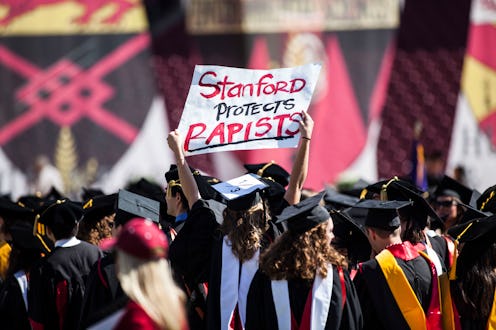News
Why Is Reported Rape On The Rise?

Believe it or not, this is good news: The Feds have found the number of reported sexual assaults on college campuses have increased by 50 percent over the last decade. It may sound like nothing to celebrate, but a surge in sexual assault reporting is, actually, a very good thing. In fact, it points to a promising trend: Anti-sexual assault policies are actually working.
The Stats
According to the National Center for Education Statistics, 3,300 forcible sex crimes were reported on college campuses in 2011, up from just 2,200 in 2001. The number of forcible sex offenses in 2011 represents 11 percent of all criminal incidents on college campuses, and breaks down to 2.2 sex offenses per 10,000 full-time-equivalent students. For some comparison, in 2001 there were 1.9 forcible sex crimes per 10,000 FTE students.
Conversely, the NCES report found that reported crime on college campuses decreased between 2001 and 2011. Forcible sex offenses was the only category to see an increase — about 52 percent — in reported crime during the 10-year span. The report took into account 2-year and 4-year schools, but crimes that occurred off campus were not included.
The report also found that 4-year public institutions had higher numbers of reported sex offenses than 4-year non-profit schools over the 10-year span. Public 2-year institutions and 4-year for-profit schools had the lowest number of reported sex crimes.
What The Stats Mean
This could mean that college administrations are finally taking sexual assault seriously — or at least beginning to. The NCES report is consistent with a recent NPR investigation that found campus rape reports increased 49 percent between 2008 and 2012. "It's a good thing that more victims are reporting because they're getting the help and support they need from their institutions," Daniel Carter, director of the 32 National Campus Safety Initiative, told NPR. "For far too long, they've been left on their own."
A Boston Globe review of federal education stats, released last February, also found that campus rape reporting was up among Boston-area colleges. The Globe reported that forcible sex offenses increased by 40 percent between 2008 and 2012 at 22 of the largest college campuses in Boston and its surrounding areas. In all, there were 113 forcible sex crimes in 2012 across those 22 college campuses.
Reported Sex Crimes Don't Reflect The Real Numbers
Although higher crime reports typically mean more crime is occurring, that's not the case with sexual assault. According to the Rape, Abuse & Incest National Network, 60 percent of sex crimes still go unreported, and only 10 percent lead to an arrest. The task for college administrators, then, is not only getting sexual assault victims to come forward, but to also handle their reports timely and accurately.
And this should be a top priority, considering that some of these reported sexual assault stats seem alarmingly low. It's hard to believe that Boston, which is considered America's College Town, only had 113 sex offenses in 2012 — especially when it's estimated that one in five women are sexually assaulted on college campuses.
Although prevention is key, changes in sexual assault reporting and prosecution in arenas outside of higher education have shown that policy reform can create an environment where victims can come forward and be taken seriously. For instance, since the Department of Defense — with directives from President Obama — began cracking down on the high rate of sexual assault among its troops, reported sex offenses have increased by 50 percent in just one year.
Meanwhile, the FBI reported last February that there has been a surge in reported sex offenses since they agency modified its definition of rape from "forcible" to any non-consensual act done without consent. Rape-prevention advocates say the new definition allows for more victims to report their crimes.